
Horatio Seymour was an American politician. He served as Governor of New York from 1853 to 1854 and from 1863 to 1864. He was the Democratic Party nominee for president in the 1868 United States presidential election, losing to Republican Ulysses S. Grant.

The Georgia Republican Party is the affiliate of the Republican Party in the U.S. state of Georgia and one of the two major political parties. It is the current favored party in the state and is chaired by Joshua McKoon.

The 1861 California gubernatorial election took place on September 4, 1861. Incumbent Governor John G. Downey was not a candidate for renomination, as his Democratic Party had violently ruptured over the issue of slavery and secession. Downey was a Lecompton Democrat, those who favored slavery in the Kansas Territory and who were running as now as the Breckenridge or "Chivalry" Democrats. These Chivalry Democrats supported Attorney General John McConnell. Anti-slavery or anti-secession Democrats were the "Unionist" Democrats who favored John Conness.

United States gubernatorial elections were held on November 5, 2002, in 36 states and two territories. The Republicans won eight seats previously held by the Democrats, as well as the seat previously held by Minnesota governor Jesse Ventura, who was elected on the Reform Party ticket but had since renounced his party affiliation. The Democrats won 10 seats previously held by the Republicans, as well as the seat previously held by Maine governor Angus King, an independent. The elections were held concurrently with the other United States elections of 2002.

The 1962 California gubernatorial election was held on November 6, 1962. The Democratic incumbent, Pat Brown, ran for re-election against former U.S. vice president and 1960 Republican presidential nominee Richard Nixon. In his concession speech the following morning, Nixon accused the media of favoring his opponent Brown, stating that it was his "last press conference" and "You won't have Nixon to kick around any more." Six years later, Nixon was elected President of the United States, and exactly ten years after this press conference he was re-elected in a landslide.
The Democratic Party of Georgia is the affiliate of the Democratic Party in the U.S. state of Georgia. It is one of the two major political parties in the state and is chaired by Nikema Williams.
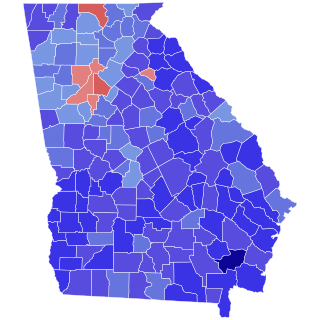
The 1970 Georgia gubernatorial election was held on November 3, 1970. It was marked by the election as Governor of Georgia of the relatively little-known former state senator Jimmy Carter after a hard battle in the Democratic primary. This election is famous because Carter, who was often regarded as one of the New South Governors, later ran for president in 1976 on his gubernatorial record and won. As of 2024, this was the last time Fulton County was carried by the Republican candidate in a gubernatorial election, the only time it failed to back Carter, and the last time a Democrat in any race won without carrying it. It is also the last time that Clarke County voted for the Republican candidate for governor.

United States gubernatorial elections were held on November 8, 2022, in 36 states and three territories. As most governors serve four-year terms, the last regular gubernatorial elections for all but two of the seats took place in the 2018 U.S. gubernatorial elections. The gubernatorial elections took place concurrently with several other federal, state, and local elections, as part of the 2022 midterm elections.
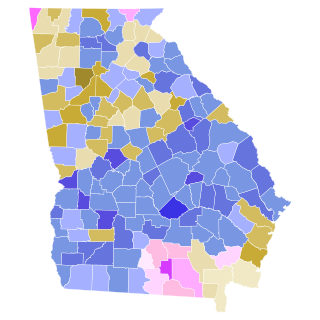
The 1946 Georgia gubernatorial election took place on November 5, 1946, in order to elect the Governor of Georgia.

The 1940 Georgia gubernatorial election took place on November 5, 1940, in order to elect the Governor of Georgia.
The 1850–51 Massachusetts gubernatorial election consisted of an initial popular held on November 11, 1850 that was followed by a legislative vote that was conducted on January 11, 1851. It saw the election of Democratic Party nominee Emory Washburn. The ultimate task of electing the governor had been placed before the Massachusetts General Court because no candidate received the majority of the vote required for a candidate to be elected through the popular election.
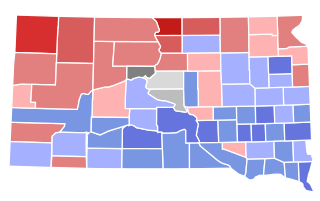
The 1926 South Dakota gubernatorial election was held on November 2, 1926. Incumbent Republican Governor Carl Gunderson ran for re-election to a second term. The election was largely a rematch of the 1924 election, with Gunderson's chief opponent from two years prior, Democrat William J. Bulow, challenging him once again. Two other candidates—Farmer–Labor nominee Tom Ayres and Pierre Mayor John E. Hipple, an independent—also ran. Though the left-leaning vote was split, Bulow was still able to win a decisive victory over Gunderson, whose support from two years earlier had completely collapsed.

The 1861 New Hampshire gubernatorial election was held on March 12, 1861.

The 1835 New Hampshire gubernatorial election was held on March 10, 1835.
Floyd L. Griffin Jr. is an American politician who served as the mayor of Milledgeville, Georgia, from 2001 to 2005, and in the Georgia State Senate from the 25th district from 1995 to 1999, as a member of the Democratic Party. He sought the Democratic Party's nomination for Lieutenant Governor of Georgia in 1998 and Georgia Secretary of State in 2022.

The 1833 Georgia gubernatorial election was held on October 7, 1833, to elect the governor of Georgia. Incumbent Democratic Union Governor Wilson Lumpkin narrowly defeated National Republican Troup nominee Joel Crawford
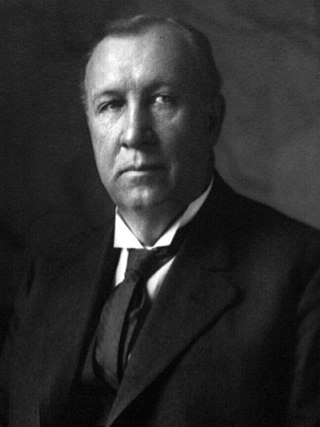
The 1910 Georgia gubernatorial election was held on 5 October 1910 in order to elect the Governor of Georgia. Democratic nominee and former Governor Hoke Smith defeated Independent Democratic candidate and incumbent Governor Joseph Mackey Brown and Socialist Party nominee C. O. Brown.
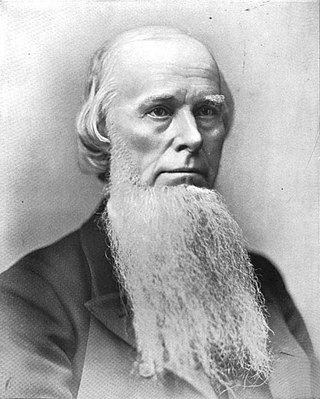
The 1857 Georgia gubernatorial election was held on October 5, 1857, in order to elect the Governor of Georgia. Democratic nominee and state circuit court judge Joseph E. Brown defeated Know Nothing (Sam) nominee and State legislator Benjamin Harvey Hill.

The 1859 Georgia gubernatorial election was held on October 3, 1859, in order to elect the Governor of Georgia. Democratic nominee and incumbent Governor Joseph E. Brown defeated Opposition Party nominee and former Cherokee Superior Court judge Warren Akin Sr.

The 1863 Georgia gubernatorial election was held on October 5, 1863, in order to elect the Governor of Georgia. It was the last gubernatorial election in Georgia under the Confederate States of America and saw Independent Democrat nominee and incumbent Governor Joseph E. Brown win a fourth and final term against Unionist nominee Joshua Hill and Pro-Administration nominee Lt. Col Timothy Furlow.


















